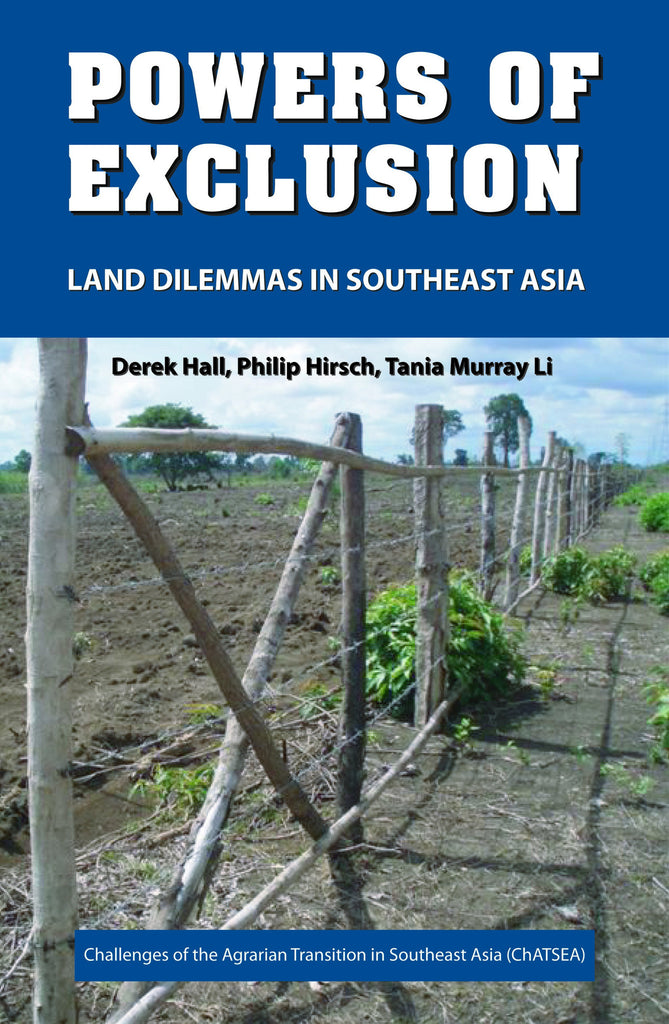Powers of Exclusion: Land Dilemmas in Southeast Asia
$38.00 SGD
Questions of who can access land and who is excluded from it underlie many recent social and political conflicts in Southeast Asia. Powers of Exclusion examines the key processes through which shifts in land relations are taking place, notably state land allocation and provision of property rights, the dramatic expansion of areas zoned for conservation, booms in the production of export-oriented crops, the conversion of farmland to post-agrarian uses, "intimate" exclusions involving kin and co-villagers, and mobilizations around land farmed in terms of identity and belonging. In case studies drawn from seven countries, the authors find that four "powers of exclusion" - regulation, market, force and legitimation - have combined to shape land relations in new and often surprising ways.
Land debates are often presented as a conflict between market-oriented land use with full private property rights on one side, and equitable access, production for subsistence, and respect for custom on the other. The authors step back from these debates to point out that any productive use of land requires the exclusion of some potential users, and that most projects for transforming land relations are thus accompanied by painful dilemmas. Rather than counterposing "exclusion" to "inclusion", the book argues that attention must be paid to who is excluded, how, why, and with what consequences.
Powers of Exclusion draws on insights from multiple disciplines to map out the new contours of struggles for land in Southeast Asia. The volume provides a framework for analyzing the dilemmas of land relations across the Global South and beyond.
"A welcome volume that covers a wide territory. The extremely useful bibliography and careful range of case studies should make this an indispensable volume for graduate students in particular, while scholars of this field will find the book a useful summation of a number of ongoing andi interlinked processes of land-use change."
Pamela Mcelwee"Occasionally a book appears that represents an especially important contribution, one likely to have lasting impact, and fill a crucial gap in the literature. Powers of Exclusion is such a book..."
Ian Baird, Journal of Asian Studies"Hall, Hirsch and Li have provided a robust resource for understanding the dynamics that fuel and obstruct land change processes."
Joanna Heathcote
Derek HALL is Associate Professor in the Department of Political Science and the Balsillie School of International Affairs at Wilfrid Laurier University. In 2009-10, he was an S.V. Ciriacy-Wantrup Visiting Research Fellow at the University of California, Berkeley. His research covers issues of political economy, the environment and agrarian relations in East and Southeast Asia.
Philip HIRSCH is Professor of Human Geography at the University of Sydney, where he is Director of the Australian Mekong Resource Centre. He has written on various dimensions of environment, development, state-village relations and natural resource politics in Thailand and the wider Mekong Region.
Tania Murray LI is Professor in the Department of Anthropology at the University of Toronto, where she holds the Canada Research Chair in the Political Economy and Culture of Asia. She has published widely on agrarian transitions, class formation, development, land struggles, community and indigeneity in Asia, with a particular focus on Indonesia.
Challenges of Agrarian Transition in Southeast Asia
Publication Year: 2011
266 pages, 229mm x 153mm
ISBN: 978-9971-69-541-5, Paperback
NUS Press

